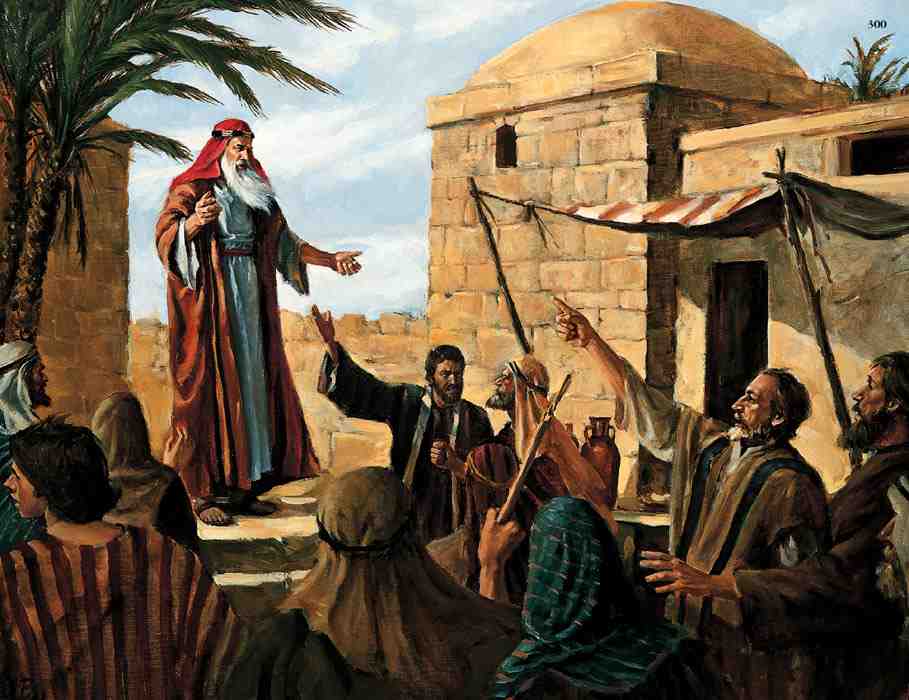Jeremiah the Prophet

Spiritual Characteristics of his Book and ministry (1)
+ Jeremiah means “Yahweh establishes”
+ He was from the village of Anathoth north east of Jerusalem. Although a priest, he never had a chance to practice priesthood duties.
+ He was not a man of miracles like Alisha, nor he was eloquent like Isaiah, nor was he a man of visions such as Daniel or Ezekiel. However, he was simply a servant who was faithful in delivering the message, this was the secret of his greatness.
+ His ministry lasted for nearly 45 years (627-582 B.C.)
+ The book of Jeremiah consists of 52 chapters and it is considered as one of the Major Prophets. It is one of the most remarkable book that overflows with refined feelings whether in God’s conversations with Jeremiah or in the words and prayers of Jeremiah.
The most distinct characteristics of Jeremiah’s ministry:
- The goal of his ministry was clear, repentance of people and returning to the bosom of God. We see this evident in repeating the word “Return” and its variations 47 times in his book. We also see the word “turn or come back” repeating 13 times and the word “forget” and its variations repeating 24 times.
- Jeremiah truly loved those whom he served, he sought after their salvation, ministered to them, and prayed for them. As St. Paul had a sense of responsibility towards whom he served, “Who is weak, and I am not weak? Who is made to stumble, and I do not burn with indignation?” (2 Corinthian 11:29), likewise, Jeremiah the prophet was full of love towards people. Perhaps the following verses reveal that:
+ “O my soul, my soul! I am pained in my very heart! My heart makes a noise in me; I cannot hold my peace.” (Jeremiah 4:19).
+ “I would comfort myself in sorrow; My heart is faint in me… For the hurt of the daughter of my people I am hurt. Is there no balm in Gilead, Is there no physician there? (Christ will be the physician). Why then is there no recovery For the health of the daughter of my people?” (Jeremiah 8:18-22).
+ “Oh, that my head were waters, And my eyes a fountain of tears, That I might weep day and night For the slain of the daughter of my people (victims of sin)!” (Jeremiah 9:1). + “O Lord, though our iniquities testify against us, Do it for Your name’s sake; For our backslidings are many, we have sinned against You. O the Hope of Israel, his Savior in time of trouble, why should you be like a stranger in the land, and like a traveler who turns aside to tarry for a night? Why should you be like a man astonished, like a mighty one who cannot save (because we reject Him)? Yet You, O Lord, are in our midst, and we are called by Your name; Do not leave us!” (Jeremiah 14:7-9).
He offered this love despite the rejection and repulsion from most people around him. Nonetheless he found complete comfort in the bosom of God and joy and peace in His words. He also said“Your words were found, and I ate them, And Your word was to me the joy and rejoicing of my heart; For I am called by Your name, O Lord God of hosts.” (Jeremiah 15:16)
3. Jeremiah was faithful in delivering the message. We can summarize, from his book, this divine message in seven elements: Reproach - Encouragement – Rebuke- Guidance – Clarifying facts - Prophecies - Illustrative examples. These seven elements may paint a general picture about God’s approach towards his people. Thus, this message is fit for all of humanity throughout all ages. Therefore, with the grace of God, we will present the elements of this divine message in the next three articles. We will include some verses from the book for each element to strengthen the intended meaning.
Peace of Christ be with you.